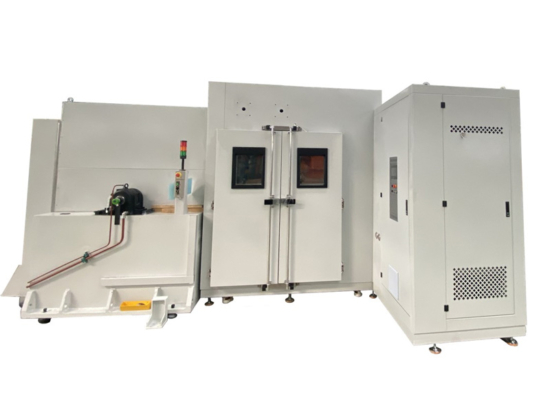Smithers expands tyre testing capabilities
 The new unit tests tyre rolling resistance at ambient temperatures between 40°C to 40°C (Photo: Smithers)
The new unit tests tyre rolling resistance at ambient temperatures between 40°C to 40°C (Photo: Smithers)
With the addition of a new high-and low-temperature rolling resistance testing machine at its tyre and wheel testing laboratory in Suzhou, China, testing, consulting, information and compliance services firm Smithers is equipped to conduct rolling resistance testing on PCR, LT and light-duty TBR tyres at ambient temperatures between 40°C to 40°C (-40°F to 104°F). The new machine will be fully operational and begin running client data this month.
Rolling resistance and the role played by tread compounding has been studied since the early 1990s, with this performance criterion taking on a far greater significance over the past decade. Current tyre rolling resistance standards from ISO, ECE, SAE, and other regulatory bodies are designed to assess tyre rolling resistance at an ambient temperature of 24°C or 25°C. However, the viscoelasticity of rubber varies significantly in different temperatures. In order to gain a comprehensive understanding of the tyre’s impact on a vehicle’s fuel emissions or cruising range, it is crucial to test rolling resistance at different temperatures.
Optimising solutions to gain an edge
“Smithers is dedicated to fulfilling our long-standing promise of providing our clients with key testing capabilities to meet their changing R&D needs,” says Henry He, general manager of the Tire and Wheel Testing Center Asia Pacific, which is part of Smithers Materials Science and Engineering Division. “With this new investment, our goal is to help our clients verify product performance and optimise solutions to gain an edge over their competition.”
“At Smithers, our top priority is meeting our clients’ needs by delivering accurate data, on time, with excellent service,” adds Derek Read, Asia region vice-president, Global Development, Smithers Materials Science and Engineering Division. “Our strategy is focused on investing in test capabilities that align with the ever-changing landscape of tyre technology and meet our clients’ R&D needs. Investing in high-and low-temperature rolling resistance testing is a critical step in this strategy for us and for our clients.”
Comprehensive test capabilities
Smithers first established tyre and wheel testing operations in Suzhou in 2011 in order to serve its global client base and a growing market in the Asia Pacific region. Testing capabilities include endurance and high-speed tyre testing with slip and camber angle, plunger/bead un-seat measurement, oven aged durability testing, dynamic ozone resistance durability testing, dynamic low-temp durability testing, rolling resistance testing, air permeation testing, government compliance, footprint, tyre electrical resistance measurement, and competitive benchmarking. Wheel testing capabilities include radial, rotary, impact, and corrosion. The tyre and wheel test laboratory in Suzhou is co-located with a Smithers product testing laboratory that opened in 2019.

 Davanti
Davanti Tokumeigakarinoaoshima - CC
Tokumeigakarinoaoshima - CC
Comments